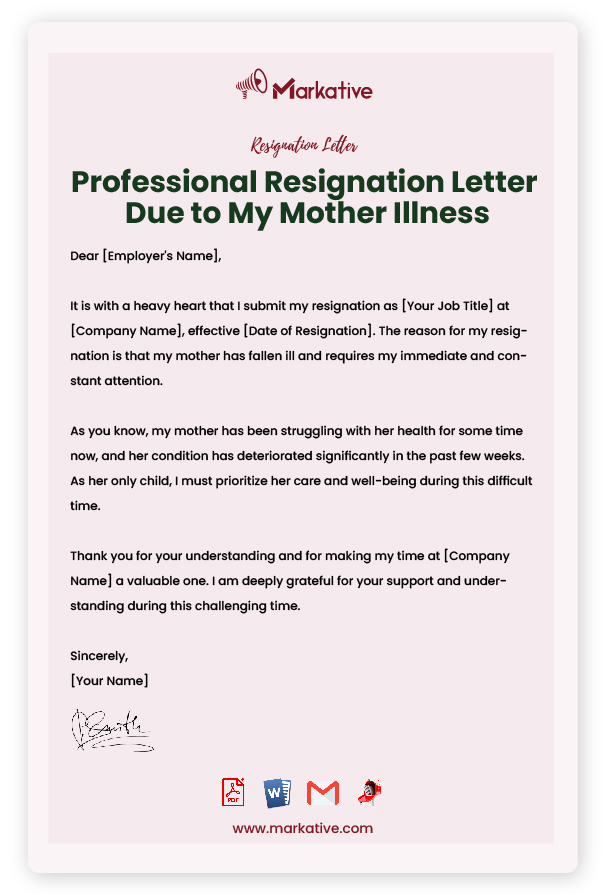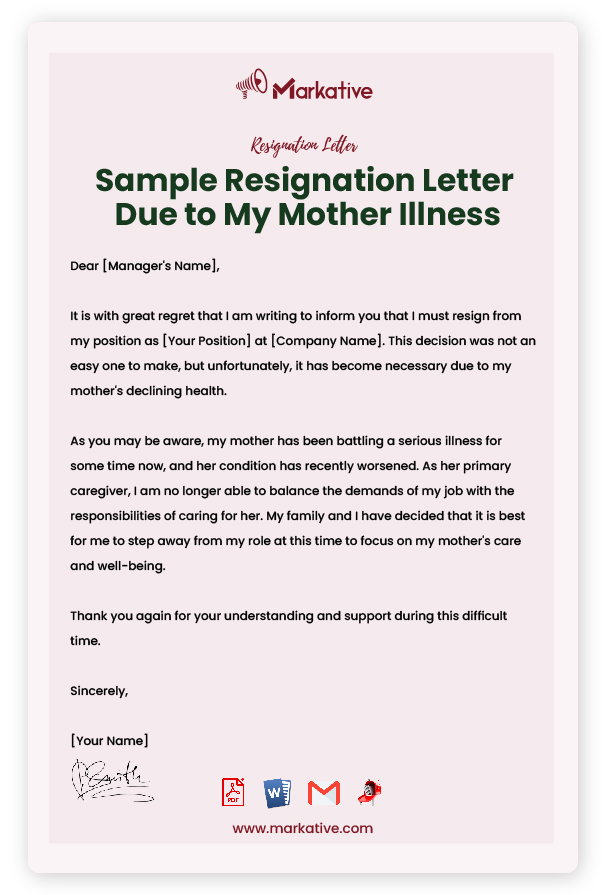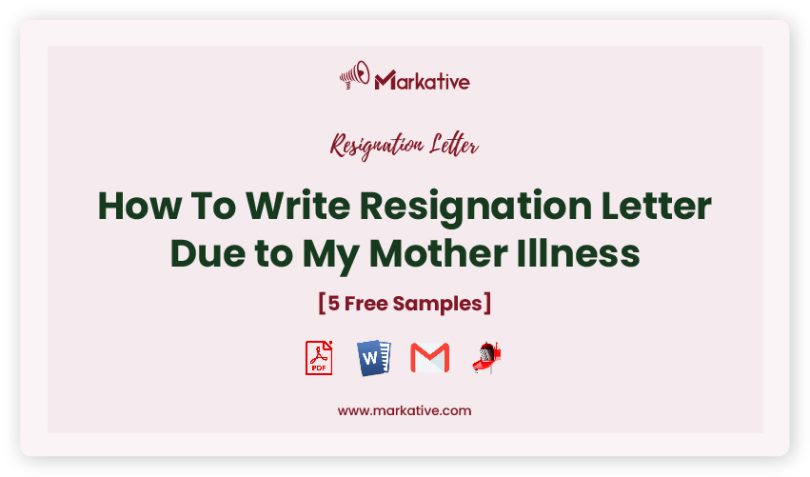Resigning from a job can be a difficult decision, especially when it is due to personal reasons such as a family member’s illness. However, in such situations, it is important to prioritize family and take necessary steps to ensure their well-being. Writing a resignation letter is an essential step towards a graceful exit from a job. It not only helps maintain professional relationships but also leaves a lasting impression on the employer and co-workers. In this article, we will discuss the importance of a Resignation Letter Due to My Mother Illness and how it can create a positive impact.
A well-crafted resignation letter can make a significant difference in how the employer perceives the resignation. It demonstrates a level of professionalism, respect, and consideration towards the company and colleagues. A good resignation letter also provides closure and clarity to the situation, which can be helpful for the employer and co-workers. When resigning due to a mother’s illness, it is essential to convey the situation in a concise and empathetic manner. A resignation letter can help achieve this objective and make the transition easier for everyone involved.
Lastly, resigning due to a mother’s illness can be an emotional experience. It is a decision that can impact one’s career and personal life significantly. In this article, we will provide insights on how to write a resignation letter due to a mother’s illness, including tips on what to include, how to structure the letter, and the tone to adopt. We will also discuss some common mistakes to avoid and share some examples of resignation letters to provide inspiration. Whether you are considering resigning due to your mother’s illness or supporting someone who is, this article will be a valuable resource.
How To Write Appealing Resignation Letter Due to My Mother Illness ?
Writing a resignation letter due to a family member’s illness can be a difficult task. It’s important to convey your message professionally while also expressing empathy towards your employer and colleagues.
5 Steps on How To Write Appealing Resignation Letter Due to My Mother Illness:
Step 1: Start with a formal greeting and state your intention to resign due to your mother’s illness.
Example: “Dear [Manager’s name], I am writing to inform you of my resignation from my position as [Job title] effective [Date], due to my mother’s illness.”
Step 2: Express gratitude towards your employer and colleagues for the opportunities and experiences gained during your time in the company.
Example: “I would like to express my sincere gratitude for the opportunities and experiences that I have gained during my time in the company. It has been a pleasure working with such a supportive and professional team.”
Step 3: Explain your situation in brief, mentioning the reason for your resignation and how it has impacted you personally.
Example: “My mother’s illness requires my full attention and care, and I am unable to continue working in a full-time capacity. This has been a difficult decision for me, but I must prioritize my family at this time.”
Step 4: Offer to assist with the transition process and ensure a smooth handover to your successor.
Example: “I will do my best to ensure a smooth transition by completing my outstanding tasks and assisting with the training of my replacement, if required.”
Step 5: End the letter on a positive note, thanking your employer and colleagues again and expressing your hope for future opportunities.
Example: “Once again, thank you for your understanding during this challenging time. I hope that our paths cross again in the future and I wish the company continued success.”
Conclusion: In conclusion, writing a resignation letter due to a family member’s illness requires empathy and professionalism. By following these steps and using the provided examples, you can write an appealing resignation letter that expresses your situation while also maintaining a positive relationship with your employer and colleagues.

Sample Resignation Letter Due to My Mother Illness
Dear [Manager's Name], It is with great regret that I am writing to inform you that I must resign from my position as [Your Position] at [Company Name]. This decision was not an easy one to make, but unfortunately, it has become necessary due to my mother's declining health. As you may be aware, my mother has been battling a serious illness for some time now, and her condition has recently worsened. As her primary caregiver, I am no longer able to balance the demands of my job with the responsibilities of caring for her. My family and I have decided that it is best for me to step away from my role at this time to focus on my mother's care and well-being. I would like to express my deepest gratitude to you and the rest of the team at [Company Name] for the opportunity to work alongside such talented and dedicated professionals. I have learned so much during my time here, and I will always treasure the experiences and memories that I have gained. I will do everything in my power to ensure a smooth transition for my replacement and to tie up any loose ends before my departure. Please let me know what I can do to facilitate the process. Thank you again for your understanding and support during this difficult time. Sincerely, [Your Name]
Professional Resignation Letter Due to My Mother Illness
Dear [Employer's Name], It is with a heavy heart that I submit my resignation as [Your Job Title] at [Company Name], effective [Date of Resignation]. The reason for my resignation is that my mother has fallen ill and requires my immediate and constant attention. As you know, my mother has been struggling with her health for some time now, and her condition has deteriorated significantly in the past few weeks. As her only child, I must prioritize her care and well-being during this difficult time. I want to express my gratitude for the opportunities and experiences I have gained while working at [Company Name]. I appreciate the support and encouragement you and the team have provided during my tenure. I will do my best to ensure a smooth transition and complete any outstanding projects before my departure. Please let me know if there is anything I can do to assist in this process. Thank you for your understanding and for making my time at [Company Name] a valuable one. I am deeply grateful for your support and understanding during this challenging time. Sincerely, [Your Name]
Resignation Letter Due to My Mother Illness with Reason
Dear [Manager's Name], I am writing to inform you that I have decided to resign from my position at [Company's Name], effective [Date of Resignation]. The reason for my resignation is the deteriorating health condition of my mother, who has been diagnosed with a serious illness that requires my full attention and support. As much as I have enjoyed working with the team and being part of this great organization, I have to prioritize my family at this crucial time. My mother needs me to be there for her during her treatment, and I cannot continue to balance both responsibilities effectively. I want to thank you for the opportunity you gave me to work with such a supportive and collaborative team. I have learned a lot during my time here, and I will always cherish the memories of my time here. I assure you that I will do everything in my power to ensure a smooth transition of my responsibilities to my successor. I will also provide any support that may be needed during this period. Thank you for your understanding and for your support during my time here. Sincerely, [Your Name]
Urgent Resignation Letter Due to My Mother Illness Sample
Dear [Manager's Name], I am writing to inform you that I must resign from my position at [Company Name] effective immediately. This decision was not an easy one, but it has become necessary due to my mother's declining health. As you may know, my mother has been battling a serious illness for some time now, and her condition has recently taken a turn for the worse. As her primary caregiver, I must be available to attend to her needs and ensure that she receives the care and attention she requires. I want to express my gratitude for the opportunities that [Company Name] has provided me during my time here. I have learned a great deal and will take those skills with me in my future endeavors. I apologize for any inconvenience that my sudden resignation may cause and will do everything I can to ensure a smooth transition. I am available to assist in any way I can during this time of transition. Please let me know how I can be of assistance. Thank you for your understanding. Sincerely, [Your Name]
Simple Resignation Letter Due to My Mother Illness
Dear [Employer's Name], I am writing to inform you that I must resign from my position as [Your Position] effective immediately. Unfortunately, my mother has been diagnosed with a serious illness and requires my full-time care and attention. I have enjoyed my time working at [Company Name] and appreciate the opportunities and experiences I have gained while here. I am grateful for the support and guidance provided by my colleagues and supervisors during my time here. I apologize for any inconvenience my resignation may cause and assure you that I will do everything possible to ensure a smooth transition during this difficult time. Thank you for your understanding. Sincerely, [Your Name]
How Much Notice Should You Give for a Resignation Letter Due to My Mother Illness?
According to a report published by the US Bureau of Labor Statistics in 2021, the average length of time an employee stays with their employer is 4.1 years. The report also found that the average time an employee spends at their current job before resigning is 2.8 years. However, these figures vary depending on industry and job level. For example, the average tenure of a CEO is much longer than that of an entry-level employee.
When it comes to resigning from a job due to a personal matter, such as a family member’s illness, it’s important to consider the impact on both yourself and your employer. In most cases, it’s best to give as much notice as possible to allow your employer time to find a replacement and make necessary arrangements. Two weeks’ notice is a standard amount of time, but if possible, it’s advisable to give more notice, especially if you’re in a senior position or your job requires a lengthy handover process. Additionally, it’s important to communicate openly and honestly with your employer about your reasons for resigning and work together to make the transition as smooth as possible.

Is it Ok To Email a Resignation Letter Due to My Mother Illness?
Yes, it is generally acceptable to email a resignation letter due to a family member’s illness. However, it is important to consider the specific circumstances and the company’s policies. It is recommended to communicate with your supervisor or HR representative to ensure that the resignation is handled appropriately and in a professional manner. Here is an example of a brief resignation email:
Dear [Supervisor's Name], I regret to inform you that I must resign from my position as [Job Title] effective immediately. Unfortunately, my mother has become very ill, and I need to take some time off to care for her. I apologize for any inconvenience this may cause, and I appreciate the support and opportunities provided during my time at [Company Name]. Please let me know if there is anything I can do to assist with the transition. Sincerely, [Your Name]
Common Mistakes When Writing a Resignation Letter Due to My Mother Illness?
- Not being clear about the reason for resignation: When writing a resignation letter due to your mother’s illness, it’s important to clearly state the reason for your resignation. Make sure you mention that you’re resigning because of your mother’s illness.
- Providing too much personal information: While it’s important to provide a reason for your resignation, it’s also important to maintain a level of professionalism. Avoid providing too much personal information about your mother’s illness, as this is not necessary for your resignation letter.
- Not giving enough notice: Make sure you give your employer enough notice before resigning. While it may be difficult to leave your job due to your mother’s illness, it’s important to give your employer ample time to find a replacement and to transition your work to someone else.
Conclusion:
Writing a resignation letter due to a mother’s illness can be a challenging and emotional experience. However, it’s important to remember to be professional and concise while expressing your gratitude for the opportunities given to you. It’s best to send the letter as soon as possible to allow your employer enough time to find a suitable replacement.
Common mistakes when writing a resignation letter include being overly negative or critical, failing to provide sufficient notice, or being too vague in your reasons for leaving. To help you with the process, there are multiple free and ready-to-use templates available that can serve as a guide for crafting your own letter. Whether you choose to use a template or write your own, always remember to be respectful, courteous, and professional throughout the process.







